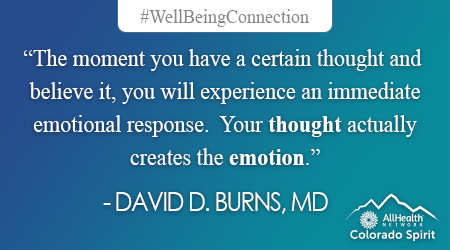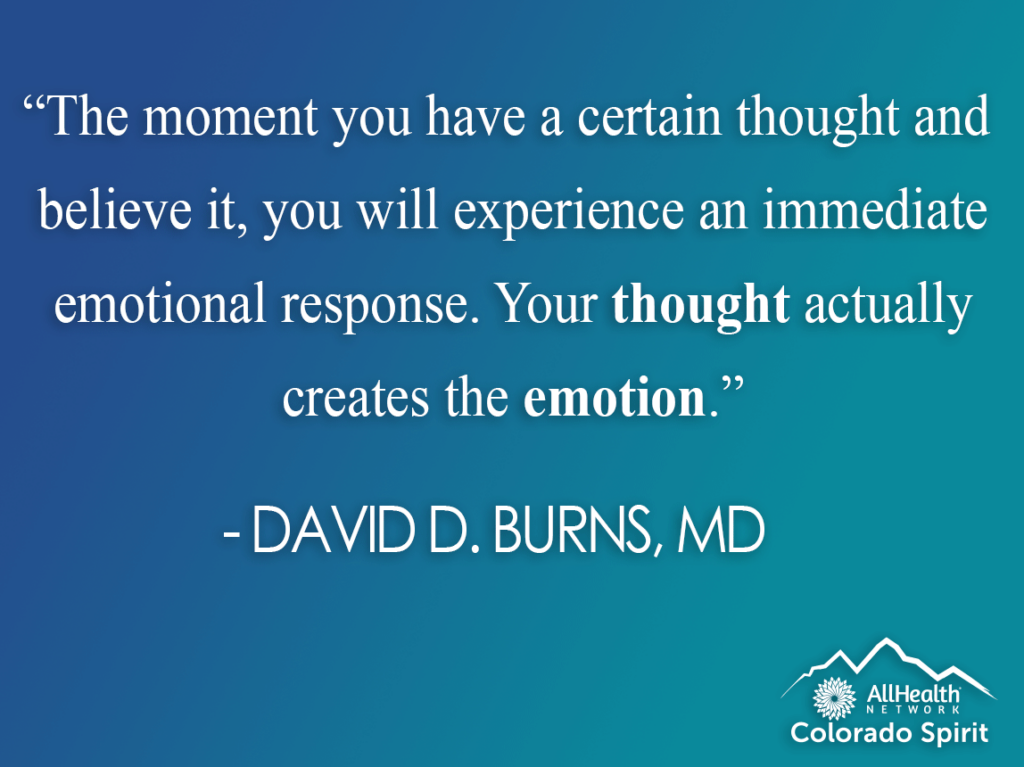Welcome to the Weekly Well-Being Connection! Each week we will share advice from our clinical experts on ways to care for your mental health and well-being throughout COVID-19.
We are excited to have Colorado Spirit Counselor, Sara Harris, LSW, write this week’s post.
What would you say if I told you that it’s not the event that’s upsetting you, it’s your thoughts? When I heard David Burns say this in his Ted Talk about why we sometimes fall into black holes of depression, anxiety and self-doubt, I felt myself becoming a little defensive. It’s just been so easy to equate the pandemic’s hardships, restrictions, and disappointments with how I am feeling.
Reframing Negative Thoughts
“Reframing” is a technique used in Cognitive Behavioral Therapy (CBT) to identify automatic thoughts and replace them with more balanced thoughts. The practice of identifying and stopping these distortions/negative thoughts is crucial in breaking the cycles of stress, anxiety, and depression that so many individuals find themselves stuck in.
In his book, Feeling Good, Dr. David Burns highlights common thought patterns or cognitive distortions that can get us stuck in negative emotions.
- All or Nothing thinking – Seeing everything as either a strict success/failure. For example, stating that you will never overcome your anxiety after one coping technique didn’t work.
- Discounting the positive – Disregarding positive experiences in order to justify harmful patterns.
- Jumping to conclusions – Making assumptions about what will happen or what others will think based on minimal or no evidence.
- Emotional reasoning – Coming to far-fetched or untrue conclusions based purely on emotion.
Reframing Your Thoughts: Practice
If any of this information resonated with you in some way, and you’re wanting to practice, here is a place to start.
- Practice noticing your cognitive distortions – Every time you’re experiencing a distortion, point it out to yourself. As an example, feeling anxious before an exam. Are you telling yourself you’re going to fail? Are you thinking that if you fail this exam, it will lead to a long line of failures?
- Evaluate the evidence – Take out your thoughts and emotions for a second, and think about what the actual facts of the situation are. Ask if there is a reframe you can apply? The facts are, you’ve been going to class, and know the material well. Tell yourself even if you don’t do as well as you would like on this test, there will be other opportunities in class to keep your grade up.
- Practice compassion – Give yourself grace and patience. Maybe you don’t pass this exam. Treat yourself as you would a friend, relating to yourself in a way that’s forgiving, accepting, and loving.
Learn and Avoid Unhelpful Thoughts
During the COVID-19 outbreak, you might have concerns about safety, feeling unable to cope, helplessness, guilt and anger. While it is understandable to feel this way, you might have some automatic thoughts that are making these reactions more intense. You may find it useful to reframe your thoughts, which will impact your emotions and reactions. If you’re interested in learning more about reframing, specifically during the pandemic, the National Center for Post-Traumatic Stress Disorder (PTSD) has created a table of common unhelpful thoughts and alternatives around safety, hopelessness, guilt, and anger.
Would speaking to someone help?
To speak with someone in the Colorado Spirit Program about stress related to the pandemic, please call 720-707-6789 or visit our web page at www.allhealthnetwork.org/Colorado-Spirit
For information about other services at AllHealth Network or to get connected with ongoing behavioral health support, please call: 303-730-8858.
AllHealth Network is continuing to provide service via telehealth or by phone and our Crisis Walk-in Center remains open 24/7. To learn more about what other community mental health centers are doing, please visit The Colorado Behavioral Health Council COVID-19 website.
If you are experiencing a mental health crisis and are in need of immediate assistance, please call the Colorado Crisis Hotline at 1-844-493-TALK (8255) or text TALK to 38255.


